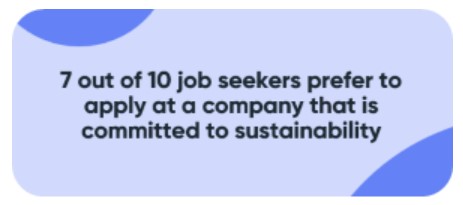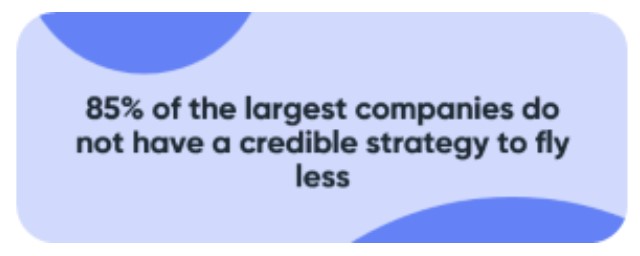The crucial role of sustainability in winning over today’s job applicants.
Sustainability is more than just a trend; it is a necessity for companies in order to fulfil both regulatory and social requirements. More and more employees place significant emphasis on this aspect, reflecting it in their career choices. When choosing a new job, a company’s ecological and social responsibility is becoming increasingly important. Young professionals not only want a job that meets their individual expectations, but also one that is compatible with their understanding of sustainability. According to a study conducted by Stepstone in 2022, almost half of all respondents stated that they would specifically look for jobs at sustainable companies if they were to change jobs – and seven out of ten would also be more likely to apply there1.

The importance of a credible sustainability strategy for a company’s employer brand should not be underestimated. While only a small percentage of the largest companies are actually on the path to Net Zero, it is becoming increasingly influential to be able to demonstrate real and measurable progress towards more sustainability2.
But what does sustainability mean for companies in concrete terms?
Initially, institutional guidelines like the Sustainable Development Goals (SDGs) play a crucial role. These goals promote not only ecological sustainability but also social responsibility in the workplace. The SDGs are often used as frameworks for developing sustainability strategies, though they are not legally binding. The Corporate Sustainability Reporting Directive (CSRD) goes one step further, legally obliging companies to reduce their emissions from operations and to demonstrably report this reduction (you can find out what the CSRD means for companies in detail here). Companies must translate these external requirements into internal targets and measures in order to fulfil both legal and social expectations.
Business travel has proven to be particularly complex: on the one hand, they are a symbol of status and prestige for many employees; on the other hand, they are a significant source of operational emissions. Thus, companies face the challenge of minimizing the carbon footprint of business travel while simultaneously finding ways to make these adjustments employee-friendly.
So how can companies achieve their reduction targets?
Although such a measure effectively reduces the number of journeys, it does nothing to strengthen the corporate culture and tends to alienate employees. This may not sound very intuitive at first, but it becomes more understandable if you divide the workforce into different groups. A survey conducted by eco.mio with over 150 business travelers identified three main groups:
- Donald: Employees who exclusively fly for business trips and do not consider taking the train. In the case of strict travel bans, there’s a risk that these employees become dissatisfied.
- Greta: Employees who place high value on sustainability and are willing to sacrifice personal comfort for it. However, companies must provide them with suitable working conditions, such as remote work, time buffers for business trips, or additional overnight stays.
- Moritz: Employees who pay attention to a potential employer’s ESG standards, yet are still accustomed to certain comfort standards and time schedules. Essentially, a “Moritz” is aware of sustainability and willing to change their behavior, but existing habits in business travel make the transition challenging.
It’s clear that the workforce is not uniform. Some would be very reluctant to give up flying, while others would consider trains as the only option. Between these lies the greatest potential for companies to reduce emissions: moving employees, whom we call “Moritz,” towards more sustainable travel decisions.
So how can companies promote sustainable business travel?
A more sustainable alternative to travel bans would be to motivate employees to voluntarily choose more sustainable options. To standardize travel activities, 95% of large companies in Germany rely on a so-called travel policy3. This policy regulates how business trips should be planned, conducted, and accounted for. The most popular measure for reducing emissions from business travel remains reducing the number of trips. Nine out of ten companies:
- Check whether the trip is necessary or whether digital tools can replace a personal meeting.
- Combine several business trips into one trip. Through longer stays, travel routes can be used more efficiently4.
In 85% of cases, however, reduction alone is not enough to achieve Net Zero targets. The next step is to set climate targets for necessary business trips5. Adjustments to the travel policies should favor more environmentally friendly modes of transport such as train or bus, especially on routes where train alternatives exist that only take slightly longer. The most famous example would be the Berlin-Munich route. The Deutsche Bahn’s ICE Sprinter covers the distance in just four hours. For longer routes, the policy is often not sufficient to convince travelers to travel by train. This could be due to lesser comfort for longer travel times or lack of buffers for delays in the planning. Raising awareness of sustainability in corporate culture can happen, for example, through transparent communication of the company’s sustainability goals and strategies. The goal is for employees to identify with the sustainability strategy and to be intrinsically motivated and committed.

A combination of different measures is needed to encourage employees to make more sustainable travel decisions, although a recommendation alone is not enough.
Smart solutions that interrupt the traveler’s usual process directly in the booking process and allow companies to provide additional information at the point of decision, give tips or incentivize green decisions through points systems can help here. An option already used or planned by 20% of large German companies6. Transparency enables travelers to make informed and ultimately greener decisions, which in turn is rewarded. The intrinsic motivation is further increased by comparisons between colleagues through ranking/point systems and adds a playful element.
Through our eco.mio plug-in for online booking tools, we combine all these elements to significantly reduce emissions from necessary business trips.
Make your travel program attractive and sustainable. With eco.mio, companies save 20% of emissions from business travel – sounds interesting?
Find out now how we can get your employees to travel by train.




